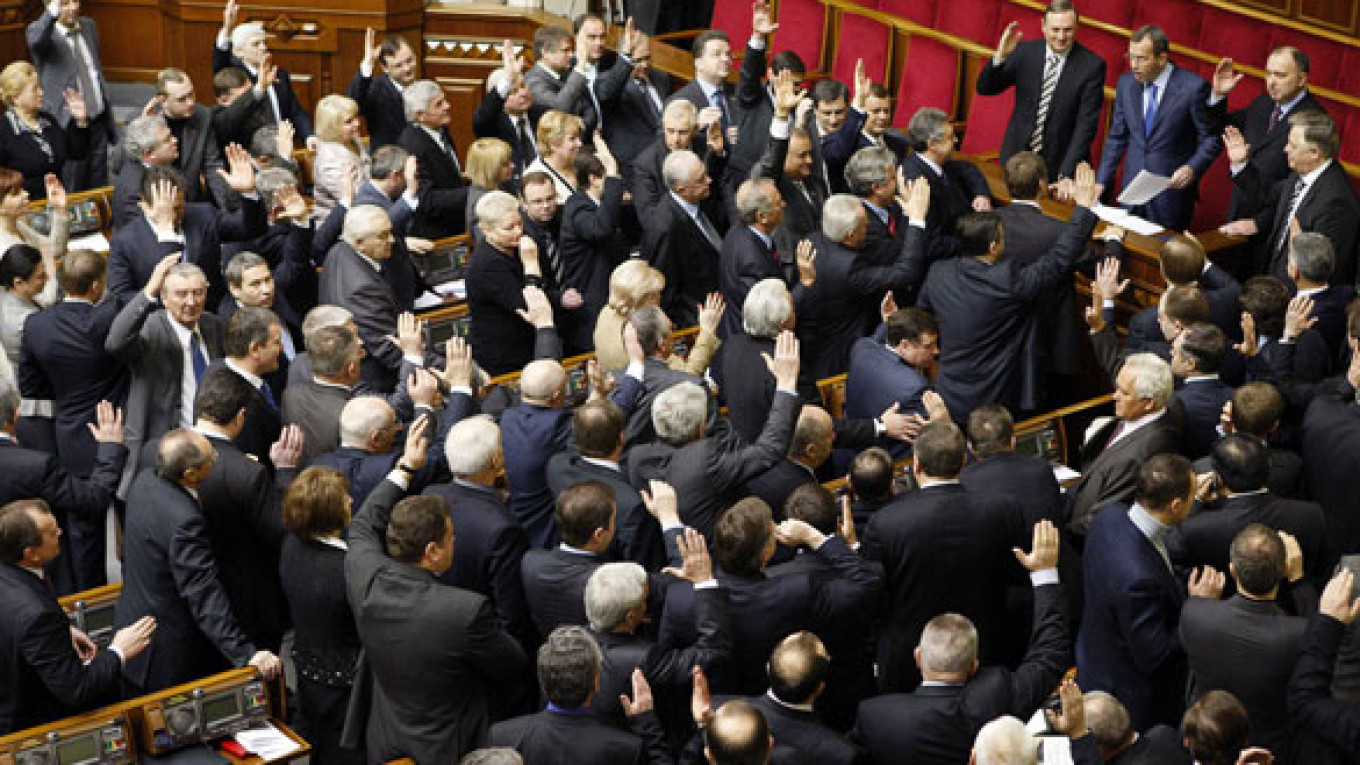KIEV — Mykola Azarov, who was appointed prime minister on Thursday, is an old ally of new President Viktor Yanukovych and served as a stop-gap acting prime minister during the 2004 Orange Revolution turmoil.
The 62-year-old Russian-born Azarov held the posts of finance minister and first deputy prime minister when Yanukovych served as prime minister from 2002 to 2005 and 2006 to 2007.
Adopt 2010 Budget
The parliament must adopt the 2010 budget, delayed for months by political infighting.
The version on the table was drafted by the Cabinet of former Prime Minister Yulia Tymoshenko, targeting a deficit of about 4 percent.
The draft can be changed and could fall foul of some of the more populist pledges made by Yanukovych in his presidential campaign.
Secure Resumption Of IMF Lending
The IMF held back a $3.5 billion tranche expected last November after the parliament increased minimum wages and pensions by up to 10 percent, a move that would cost the budget billions of dollars it does not have.
The IMF has insisted that household gas prices be increased.
Yanukovych has said he wants to renegotiate the IMF deal, which could mean months of further negotiations.
Maintain Debt Repayments
Investors continue to worry that Ukraine may have problems repaying its short-term domestic debt. The state has just one foreign debt to repay this year — a 35 billion yen ($390 million) Samurai bond due in December. Its monthly domestic debt bill is getting higher and will peak in April when the Finance Ministry has to repay treasury bills worth 3.7 billion hryvnas ($460 million).
On Wednesday, the country repaid in full and on time T-bills worth 596 million hryvnas ($75 million).
Renegotiate Gas Deal With Russia?
Many analysts believe Ukraine’s desperate public finances mean Yanukovych must push to renegotiate a 2009 deal to lower onerous gas bills. Reports have suggested Yanukovych will offer Moscow a one-third stake in the management of its gas pipelines in exchange for big price cuts.
— Reuters
He was seen as a safe pair of hands when managing the state’s finances during the 2004 political upheaval that overturned a flawed presidential election, when confidence in the hryvna national currency was severely shaken.
He has a reputation as a cautious conservative rather than a reformer, and few analysts expect him to undertake major reforms at his own initiative.
Still, his record as a past custodian of the state coffers will help him as steward of an embattled economy that has been propped up by a $16.4 billion International Monetary Fund bailout program. An early task will be to push through the troubled 2010 budget in a shape that can convince the IMF to resume funding it suspended late last year because of breached promises.
Replying to deputies’ questions before he was voted into the post, Azarov said Ukraine’s state coffers were empty. “The main task today is to redraft and get approved a realistic budget,” he told the parliament.
An austere-looking, gray-haired man, Azarov moved from Russia to Ukraine only in 1984 and speaks Ukrainian poorly — something that will not endear him to a strong nationalist community.
Analysts see him as a trusted lieutenant who can be relied on to work smoothly with Yanukovych without the kind of poisonous infighting that marked relations between former President Viktor Yushchenko and outgoing Prime Minister Yulia Tymoshenko.
Given his age and past credentials, he is unlikely to become a rival for Yanukovych’s post in the future. “Azarov suits Yanukovych completely — he will execute his duties without having any political ambitions himself,” analyst Volodymyr Fesenko said.
Azarov was born in December 1947 in Kaluga and gained a doctorate in geology and mineralogy before moving to Ukraine in 1984 when it was still part of the Soviet Union.
He formed close ties with former President Leonid Kuchma — Yanukovych’s patron — and served as head of the state tax administration for six years until 2002. He also headed the parliament’s budgetary committee.
As first deputy prime minister and finance minister from late November 2002, he undertook some tax reform, bringing the variable tax rate on personal income down to a uniform flat rate — though his reforms largely stopped there.
In December 2004, amid uproar over Yanukovych’s election in what was deemed a rigged presidential poll, he stepped in twice as acting prime minister when his patron was sent on leave and then forced to resign. In his brief spell in office, he was credited with speaking out to calm investors’ fears of a meltdown after dire warnings of financial collapse by Kuchma.
A Message from The Moscow Times:
Dear readers,
We are facing unprecedented challenges. Russia's Prosecutor General's Office has designated The Moscow Times as an "undesirable" organization, criminalizing our work and putting our staff at risk of prosecution. This follows our earlier unjust labeling as a "foreign agent."
These actions are direct attempts to silence independent journalism in Russia. The authorities claim our work "discredits the decisions of the Russian leadership." We see things differently: we strive to provide accurate, unbiased reporting on Russia.
We, the journalists of The Moscow Times, refuse to be silenced. But to continue our work, we need your help.
Your support, no matter how small, makes a world of difference. If you can, please support us monthly starting from just $2. It's quick to set up, and every contribution makes a significant impact.
By supporting The Moscow Times, you're defending open, independent journalism in the face of repression. Thank you for standing with us.
Remind me later.


